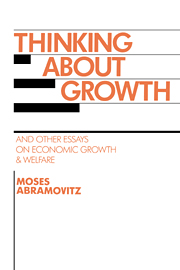Book contents
- Frontmatter
- Contents
- Editors' preface
- Preface
- Part I Growth and the economists
- Part II Studies in long-term growth
- Part III Long swings in economic growth
- Part IV Growth and welfare
- 10 Economic goals and social welfare in the next generation
- 11 Growing up in an affluent society
- 12 The retreat from economic advance: changing ideas about economic progress
11 - Growing up in an affluent society
Published online by Cambridge University Press: 22 March 2010
- Frontmatter
- Contents
- Editors' preface
- Preface
- Part I Growth and the economists
- Part II Studies in long-term growth
- Part III Long swings in economic growth
- Part IV Growth and welfare
- 10 Economic goals and social welfare in the next generation
- 11 Growing up in an affluent society
- 12 The retreat from economic advance: changing ideas about economic progress
Summary
Religion apart, no aspect of human affairs has such pervasive and penetrating consequences as does the way a society makes its living – and how large a living it makes. And few societies have experienced such radical alteration in the level of their income and in the manner in which it is earned as has this country during the last seventy-five years. In this period, in common with most of the countries which share in the civilization of the Western world, America has been passing through the complex series of changes we associate, however vaguely, with industrialization. Wherever this process has held sway, the application of science to industry and the accumulation of capital have transformed the economic life of peoples. But in America, these forces have operated in a peculiarly favorable environment and the transformation in the modes of living and working have been especially profound.
Industrialization has reshaped our lives, not only during the years people work, but during those in which they are not yet old enough to work and during those in which they are too old. In this essay, however, I will try to write about the impact of industrialization, not on the whole of our mortal span, but rather on those peculiarly malleable, impressionable, and seminal years of youth – not “from the cradle to the grave,” but from the cradle to the job.
- Type
- Chapter
- Information
- Thinking about GrowthAnd Other Essays on Economic Growth and Welfare, pp. 308 - 321Publisher: Cambridge University PressPrint publication year: 1989



